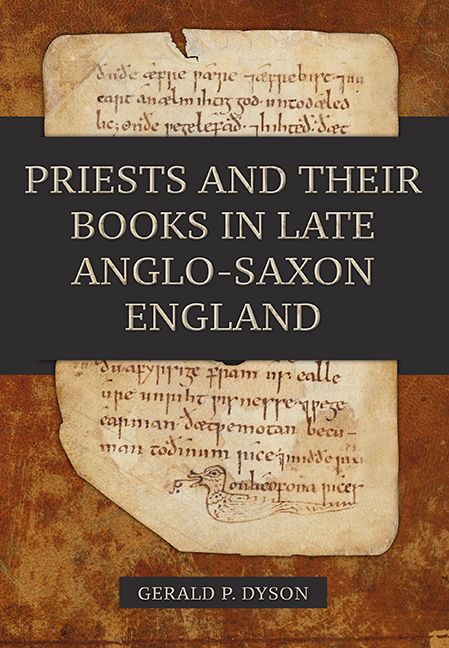Book contents
- Frontmatter
- Dedication
- Contents
- List of Illustrations
- Acknowledgements
- Introduction
- 1 Priests, Books, and Pastoral Care
- 2 “Ne cunnon þæt leden understandan”: Issues of Clerical Literacy
- 3 Demand and Supply: Production and Provision of Books for Priests
- 4 Preaching and Homiletic Books for Priests
- 5 Performing the Liturgy: Priests’ Books for the Mass and Office
- 6 Locating Penitentials, Manuals, and Computi
- Conclusions
- Appendix
- Bibliography
- Index
- Anglo-Saxon Studies
4 - Preaching and Homiletic Books for Priests
Published online by Cambridge University Press: 12 June 2021
- Frontmatter
- Dedication
- Contents
- List of Illustrations
- Acknowledgements
- Introduction
- 1 Priests, Books, and Pastoral Care
- 2 “Ne cunnon þæt leden understandan”: Issues of Clerical Literacy
- 3 Demand and Supply: Production and Provision of Books for Priests
- 4 Preaching and Homiletic Books for Priests
- 5 Performing the Liturgy: Priests’ Books for the Mass and Office
- 6 Locating Penitentials, Manuals, and Computi
- Conclusions
- Appendix
- Bibliography
- Index
- Anglo-Saxon Studies
Summary
Old English homilies are a witness to a precocious and widespread tradition of vernacular preaching in Anglo-Saxon England, one in which secular priests played a primary role. Homilies form a great deal of the corpus of Old English prose: more than ten percent of the manuscripts listed in Neil Ker's Catalogue of Manuscripts Containing Anglo-Saxon contain Old English homilies. Some aspects of these manuscripts have seen significant study in the last century, but their pastoral use and potential connections with the secular clergy have received less attention. As Tracey-Anne Cooper has pointed out, there is significant difficulty in using homilies as windows into pastoral care, due to our ignorance of how episcopal and elite aspirations for pastoral care translated into reality and the uncertainty surrounding how and to what extent homilies were performed for lay audiences. Nonetheless, English priests of the tenth and eleventh centuries were heirs to a long tradition of preaching, as is shown by episcopal prescriptions and the early, fragmentary manuscript record, and priests’ books provide a perhaps undervalued means of approach in understanding the uses of and contexts for Anglo-Saxon homilies.
The preceding chapters have addressed the contextual factors of studying priests’ books, such as literacy and the practical availability of books to priests. This chapter is the first of three that will examine specific manuscripts in greater detail. I do not attempt an exhaustive analysis of these manuscripts here; they will instead be considered specifically with relevance to their use by secular clerics in pastoral care. The initial sections of this chapter will concern themselves with the contextualization and use of Anglo-Saxon homilies, while the final section will consider three relevant manuscripts, namely the Taunton Fragment (Taunton, Somerset County Record Office, DD\ SAS/C1193/); Oxford, Bodleian Library, Junius 85 and 86; and the Blickling Homilies (Princeton, New Jersey, Princeton University Library, Scheide Collection 71).
The homiletic tradition in Anglo-Saxon England
From a very early stage in the history of the Anglo-Saxon church, priests were involved in preaching to the laity. Bede records that one of the main duties of a priest in the seventh century was to preach to the laity and the Council of Clofesho in 747 enjoined priests to preach in addition to baptizing, teaching, and visiting the sick.
- Type
- Chapter
- Information
- Priests and their Books in Late Anglo-Saxon England , pp. 110 - 145Publisher: Boydell & BrewerPrint publication year: 2019



